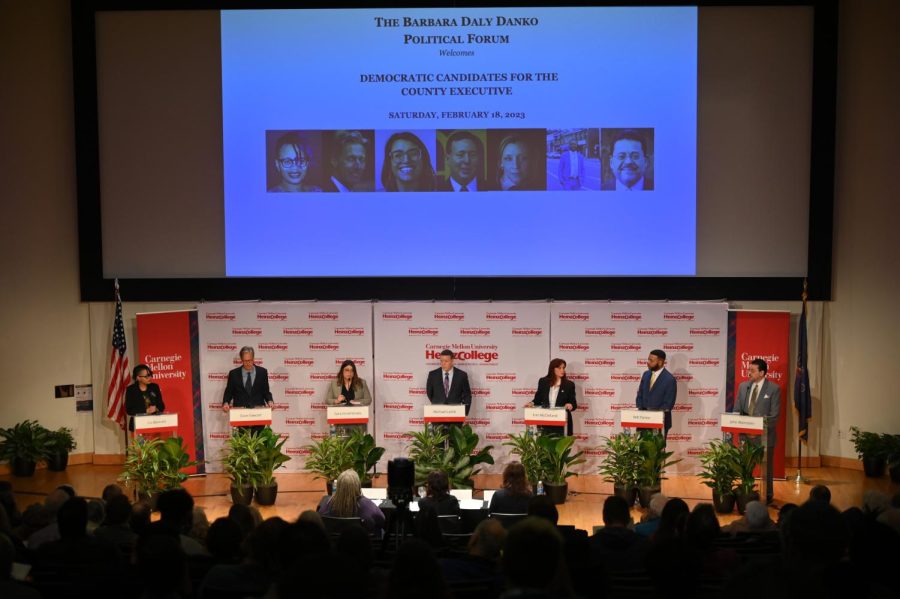Forum highlights similar goals, diverse policies in crowded county executive race
Nate Yonamine | Staff Photographer
Candidates for Allegheny County executive speak at the Barbara Daly Danko Political Forum, on Saturday at Carnegie Mellon University in the McConomy Auditorium. Pictured from left to right: Liv Bennett, Dave Fawcett, Sara Innamorato, Michael Lamb, Erin McClelland, Will Parker, and John Weinstein.
February 19, 2023
Seven candidates for Allegheny County executive took the stage at Carnegie Mellon University on Saturday to discuss air quality, affordable housing and other priorities in a crowded Democratic primary.
The Barbara Daly Danko Political Forum, sponsored by the 14th Ward’s Democratic Committee and Independent Democratic Club, attracted around 100 attendees to McConomy Auditorium to hear candidates sell their vision for Pennsylvania’s second-largest county.
The candidates largely agreed on the need for cleaner air, improved conditions in detention facilities and quality affordable housing, but expressed a wide array of approaches to achieve these goals.
The candidates included County Council member Liv Bennett, former County Council member Dave Fawcett, state representative Sara Innamorato, Pittsburgh City Controller Michael Lamb, Project Manager for the County Department of Human Services Erin McClelland, local business owner Will Parker and County Treasurer John Weinstein.
Former PNC Executive Joe Rockey is vying for the Republican nomination. Both parties will hold primaries on May 16 ahead of the Nov. 7 general election.
For the first time since 2011, the Democratic ballot won’t include Rich Fitzgerald as a candidate for county executive. Fitzgerald will fulfill his third four-year term at the end of this year, making him ineligible to run again. While none of the candidates, except for McClelland, named Fitzgerald specifically, each of the candidates expressed discontent with many of Fitzgerald’s policies.
For example, all seven candidates said they would not support an expansion of fracking in the county. Fitzgerald vetoed a bill in July that would ban new natural gas drilling in county parks, though council overrode the decision shortly after.
Lamb, who served as city controller for 15 years, referenced his Allegheny Achievers proposal throughout the forum. This program would make community college free to any high school graduate in the county.
“Investing in ourselves is not just about the hard infrastructure,” Lamb said. “It’s about investing in our people, particularly our young people.”
He also mentioned plans to form an Office of Municipal Assistance to provide support and resources for the county’s 130 municipalities.
Weinstein also has extensive experience in western Pennsylvania politics, holding the office of county treasurer since 1999. He lauded past capital investments, such as the county airport, and said he would focus on economic development and promoting the business community.
“It’s not just about cleaning up Pittsburgh and making it safe…but it’s revitalizing it to actually create economic development, because all of these things we’re talking about here today require money,” Weinstein said.
McClelland also vocalized concern over other prominent county institutions, such as the Allegheny County Jail, which she said was in need of a “zero harm principle.” The jail has grappled with reports of inhumane conditions and at least 17 deaths since March 2020.
She criticized the use of costly outside consultants, a poor workplace culture in county agencies and the decision to shutter Shuman Center. The county closed the juvenile detention facility in September 2021 after issues with theft, drug use and distributing medication.
“Here in Allegheny County, we don’t just hurt each other, we hurt our constituents. It’s unacceptable and it’s costing us a ton of money,” McClelland said.
Parker is a relatively new, but highly active figure in regional politics, mounting unsuccessful bids for Pittsburgh mayor and the U.S. House of Representatives in recent years.
As for top priorities, Parker wants to direct federal dollars that the county receives toward Black businesses and “stand up for our Black women here.” He also said the county jail is “not supposed to be a hotel” and advocated for programs to prevent first offenses and recidivism.
Fawcett, a practicing attorney, leaned on his experience working with incarcerated clients and prosecuting corporations in the forum, and said he would create a department of environmental enforcement on his first day in office to help address the county’s poor air quality.
He also spoke about his plan to create a county-wide riverside park, a proposal dating back to his days on County Council.
“It’s not just a matter of sustainability, it’s a matter of social equity,” Fawcett said, tying the park into issues of housing and transit.
Bennett also emphasized equity during the forum, citing high infant mortality rates for Black women and a lack of affordable housing in the county. As someone who lives in public housing, Bennett said she understands the gap in quality, low-cost housing, and would revive the pandemic-era Emergency Rental Assistance Program.
“We are the most affordable place to live if you have a median income, but many of us do not make the median income to achieve homeownership,” Bennett said.
In addition to more affordable housing, Innamorato advocated for low-barrier shelters like Second Avenue Commons and transitional housing resources to support the county’s growing unhoused population, as well as a holistic approach to county governance.
“We need to make sure that we’re investing in communities in a meaningful way and providing resources for youth, and quality school, and connectivity,” Innamorato said. “All of these things are interrelated and we can’t approach them as a single subject.”








